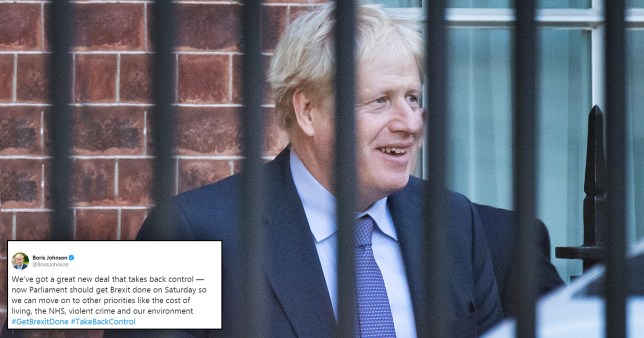BORIS Johnson was reported to have been given oxygen last night after arriving in hospital for “routine” coronavirus tests.
The PM, 55, was admitted to a London hospital on Sunday evening – 10 days after testing positive for the virus – and stayed the night there.
The Times said today he was given oxygen treatment after arriving there by car.
No10 stressed it was not an emergency trip and was a planned visit on advice from his doctor.
The admission was a “precautionary step” as he continued to have “persistent symptoms”, thought to be a high temperature.
The move comes after aides became increasingly worried about his health as Mr Johnson continued to show symptoms more than a week after he tested positive.
Government aides said Boris had been “coughing and spluttering” on video conference calls over the past few days.
Most people manage to shake off their symptoms after a week, with doctors saying patients are at risk of developing pneumonia if a temperature persists.
Last night a Downing Street spokesman said: “On the advice of his doctor, the Prime Minister has tonight been admitted to hospital for tests.
“This is a precautionary step, as the Prime Minister continues to have persistent symptoms of coronavirus ten days after testing positive for the virus.
“The Prime Minister thanks NHS staff for all of their incredible hard work and urges the public to continue to follow the Government’s advice to stay at home, protect the NHS and save lives.”
Dominic Raab, the Foreign Secretary, will chair this morning’s Covid-19 conference call in the PM’s absence, but Boris is still in charge of the Government.
If he becomes more unwell the PM has the power to delegate responsibility to any minister. It is understood Chancellor Rishi Sunak and then Michael Gove are next in the chain of command.
Dr Rupert Beale, from the Francis Crick Institute, said Mr Johnson is likely to be monitored for signs such as oxygen saturation.
He said: “They will also check blood tests to see what the immune response to the virus looks like, and to assess liver and kidney function.
“They will perform an electrocardiogram to check the heart.
“More sophisticated tests may include a CT scan of the chest to get an accurate picture of the lungs.
“They will consider the best way to deliver oxygen and will also consider other treatments depending on test results.”
GP Dr Ellie Cannon said the most common reason coronavirus patients are admitted to hospital was for “signs of breathlessness”.
She added that having the virus beyond ten days is a “red flag” and some patients who failed to get rid of the symptoms had developed a bacterial infection on top of the virus.
Dr Cannon told Sky News: “The breathlessness is a worrying sign of severe illness and can happen at any point of the illness, it can happen on Day seven or Day ten.”
Ministers urged Boris to officially steps down from leading the charge today and focus on getting better.
James Duddridge MP said: “Take care boss. Get well. Come back fighting. But for now, rest, look after yourself and let the others do the heavy lift.”




